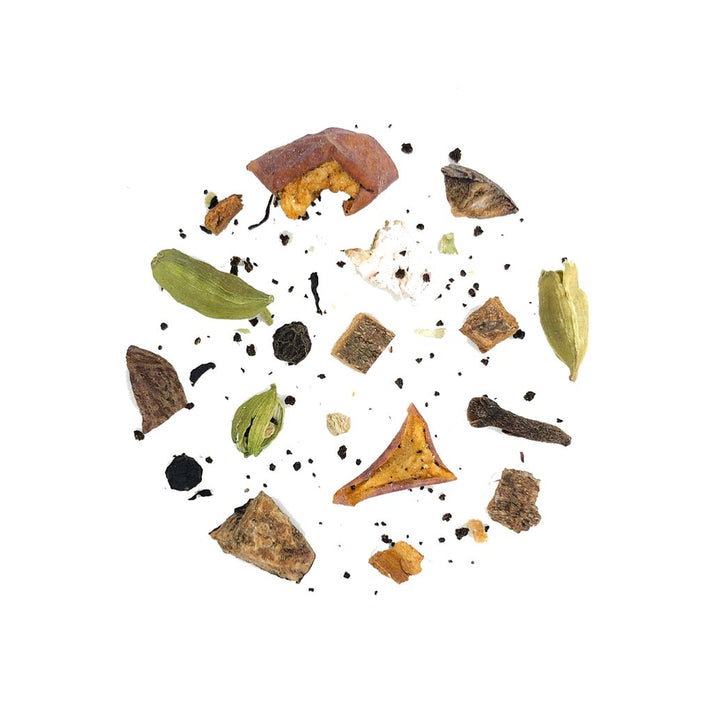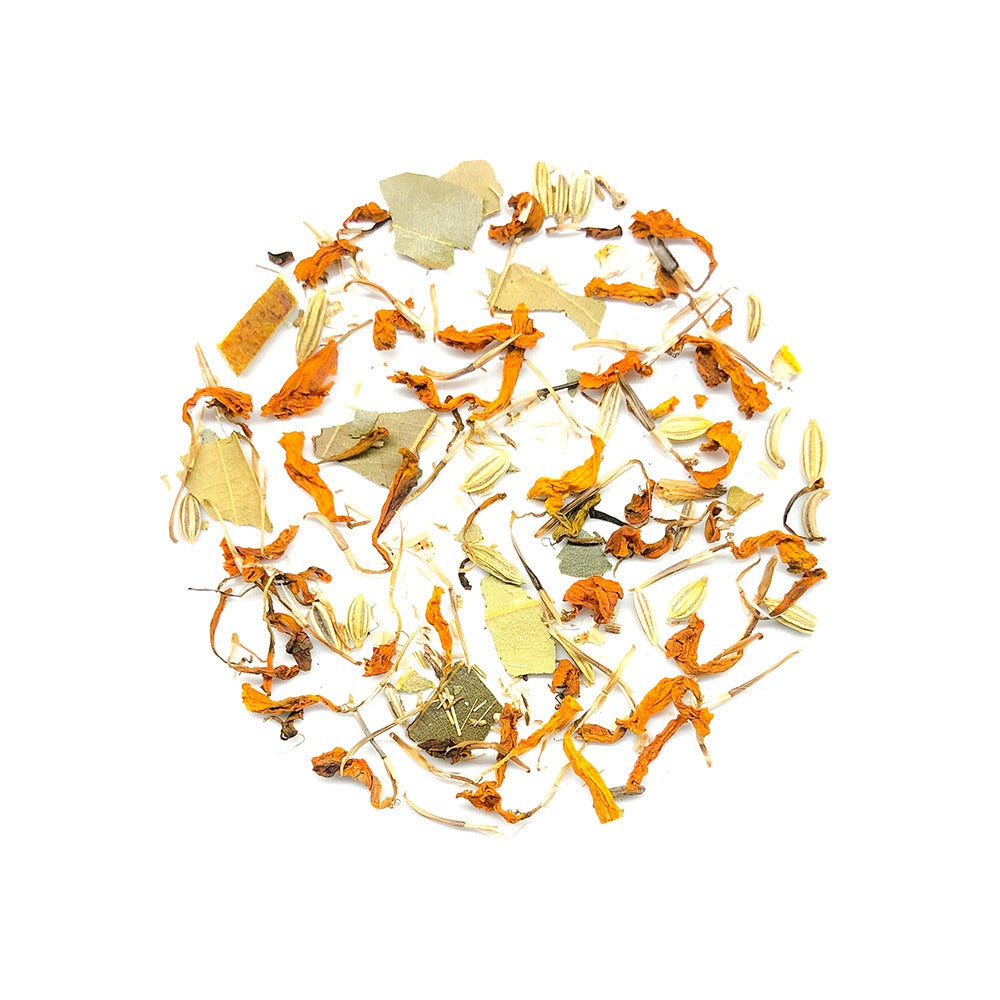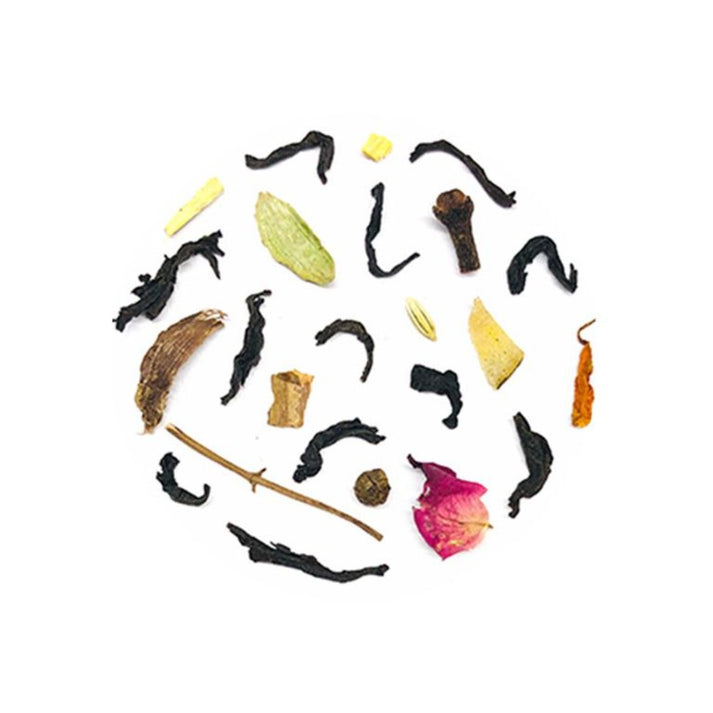The Ultimate Guide to Black Tea: Understanding, Brewing & Enjoying

Did you know that over 2 billion cups of black tea are consumed worldwide each day? As the most widely consumed tea variety in the Western world, black tea holds a special place in both our daily routines and cultural traditions. In the United States alone, black tea accounts for over 85% of all tea consumption, with Americans drinking nearly 84 billion servings of tea annually.
Yet despite its popularity, many tea enthusiasts still find themselves wondering about the nuances of this beloved beverage. What makes a truly exceptional cup of black tea? How can we maximize its wellness benefits? And why has this ancient beverage remained so relevant in our modern world of countless beverage options?
The Rich Heritage of Black Tea
Black tea's journey begins in ancient China, where it was first developed during the Ming Dynasty (1368-1644). However, it wasn't until the 1800s that black tea gained widespread popularity in the West, transforming from a luxury item into a daily staple. This transformation wasn't just about taste – it represented a cultural revolution that would shape social customs, trade routes, and even global politics.
In today's fast-paced world, black tea offers something increasingly precious: a moment of pause, a connection to tradition, and a natural source of sustained energy. Unlike the harsh peaks and crashes associated with other caffeinated beverages, black tea provides a gentle lift accompanied by mental clarity and focus – benefits that are more relevant than ever in our wellness-conscious society.
What You'll Discover in This Guide
Whether you're a curious beginner or a seasoned tea enthusiast, this comprehensive guide will help you:
- Understand the complexities of black tea production and quality
- Master the art of brewing the perfect cup
- Explore the world's finest black tea varieties
- Harness black tea's wellness benefits
- Create stunning milk tea variations at home
- Make informed decisions about tea selection and storage
Understanding Black Tea: From Leaf to Cup
What Defines Black Tea?
At its essence, black tea is a fully oxidized tea made from the leaves of the Camellia sinensis plant. But what exactly does "fully oxidized" mean, and why does it matter for your cup of tea?
Think of oxidation in tea like the browning of an apple when cut – it's a natural chemical process that transforms the leaves' compounds, creating the rich flavors, deep colors, and robust character that black tea is famous for. This process sets black tea apart from its less-oxidized cousins like green and oolong teas.
The Art of Oxidation
The transformation from fresh leaf to black tea is a carefully orchestrated process that requires both precision and artistry:
- Withering: Fresh leaves are laid out to lose moisture and become pliable
- Rolling: Leaves are rolled to break down cell walls and begin oxidation
- Oxidation: The leaves are exposed to oxygen, developing their distinctive color and flavor
- Firing: Heat is applied to stop oxidation and lock in the desired characteristics
This process typically takes 18-24 hours, with master tea makers monitoring every step to ensure optimal results. The timing and conditions during oxidation significantly influence the final flavor profile, making each batch unique.
Key Production Regions and Their Characteristics
Different growing regions impart distinct characteristics to their black teas, much like terroir in wine. Here are some notable examples:
Assam, India
- Growing Conditions: Low elevation, high humidity
- Flavor Profile: Malty, full-bodied, robust
- Best Known For: Strong breakfast teas
Darjeeling, India
- Growing Conditions: High elevation Himalayas
- Flavor Profile: Light, floral, muscatel
- Unique Feature: Known as the "Champagne of Teas"
Ceylon (Sri Lanka)
- Growing Conditions: Varied elevations
- Flavor Profile: Bright, citrusy, medium-bodied
- Notable For: Versatility in blending
Grading Systems and Quality Indicators
Understanding tea grades helps you make informed choices about your tea purchases:
Whole Leaf Grades:
- Orange Pekoe (OP): Full leaf tea
- Flowery Orange Pekoe (FOP): Superior quality with tip
- Tippy Golden Flowery Orange Pekoe (TGFOP): High-grade with golden tips
Broken Leaf Grades:
- Broken Orange Pekoe (BOP): Smaller pieces, stronger brew
- Fannings: Small particles used in tea bags
- Dust: Finest particles, often used in commercial tea bags
Quality Indicators:
- Leaf Appearance: Even color, consistent size
- Aroma: Fresh, distinctive to type
- Liquor Color: Clear, bright
- Taste: Clean, characteristic of its origin
Types of Black Tea: A World of Flavors
Ever wondered what makes each black tea variety uniquely special? Let's explore the fascinating world of both single-origin teas and popular blends that have captivated tea enthusiasts for generations.
Classic Single-Origin Teas
Single-origin teas are like fine wines, each reflecting the distinct characteristics of their growing region, climate, and processing methods.
Assam: India's Bold Treasure
Native to the lush Brahmaputra Valley in northeastern India, Assam tea captures the essence of its tropical terroir. Known for its rich malty flavor and deep copper-red color, this tea is a testament to nature's artistry.
What makes Assam special:
- Grown at low altitudes in a subtropical climate
- Distinctive malty taste with notes of caramel
- Full-bodied character that pairs excellently with milk
- Two harvest seasons: Second flush (summer) yields the most prized teas
Best enjoyed in the morning, Assam tea provides a robust start to your day with its higher caffeine content and rich, satisfying taste.
Darjeeling: The Champagne of Teas
Nestled in the foothills of the Himalayas, Darjeeling produces teas of such distinction that they've earned the title "Champagne of Teas." These prized leaves create a lighter, more nuanced cup than their Assam cousins.
Distinctive characteristics:
- Delicate muscatel flavor with floral undertones
- Light to medium body with a bright golden liquor
- Complex character that changes with each harvest season
- Best enjoyed without milk to appreciate its subtle notes
The different flushes (harvests) of Darjeeling each tell their own story: First Flush brings delicate, floral notes, while Second Flush offers the famous muscatel character.
Ceylon: Sri Lanka's Finest
Ceylon teas, produced across Sri Lanka's varied elevations, offer remarkable diversity in a single origin. From high-grown to low-grown regions, each elevation produces its unique profile.
Notable features:
- Bright, crisp flavour with citrusy notes
- Golden to copper colored liquor
- Versatile character suitable for both hot and iced tea
- Clean, refreshing finish that appeals to diverse palates
Keemun: China's Sophisticated Export
Originating from China's Anhui province, Keemun represents Chinese artistry in black tea production. This relatively young tea (developed in the 19th century) quickly gained international acclaim.
Key characteristics:
- Smooth, slightly sweet flavor with wine-like notes
- Subtle smoky undertone with chocolate hints
- Fine, twisted leaves yielding a bright red liquor
- Notable orchid-like aroma when brewed
Yunnan: Ancient Origins, Modern Appeal
From the birthplace of tea itself, Yunnan black teas offer a unique perspective on what black tea can be. Often featuring golden buds among the leaves, these teas are both beautiful and delicious.
Distinguished by:
- Rich, smooth flavor with honey and pepper notes
- Distinctive golden tips in higher grades
- Deep, earthy character with natural sweetness
- Exceptional aging potential
Popular Blended Teas
Blended teas combine different tea bases to create consistent, memorable flavors that have become beloved worldwide.
English Breakfast: The Classic Blend
Perhaps the world's most recognized tea blend, English Breakfast combines various black teas to create a robust, full-bodied cup perfect for starting the day.
Blend composition:
- Usually includes Assam, Ceylon, and Kenyan teas
- Balanced for strength and richness
- Designed to pair perfectly with milk
- Consistent, reliable character
Earl Grey: Bergamot's Gift
This aromatic blend combines black tea with oil of bergamot, creating a sophisticated and instantly recognizable flavor profile that has enchanted tea drinkers for centuries.
Signature elements:
- Bright citrus aroma from natural bergamot oil
- Usually Ceylon or Chinese black tea base
- Balanced between tea and citrus notes
- Versatile enough for multiple brewing styles
Irish Breakfast: Bold and Bright
Stronger than its English cousin, Irish Breakfast offers a more robust morning cup, traditionally blended to complement the Irish habit of adding rich milk to tea.
Key features:
- Predominantly Assam-based blend
- Malty, full-bodied character
- Deep reddish-brown liquor
- Perfect with milk and morning meals
Russian Caravan: A Journey in Tea
Named for the camel caravans that once transported tea across Asia, this blend combines several Chinese teas to create a uniquely smooth and slightly smoky cup.
Blend characteristics:
- Combination of Oolong, Keemun, and lightly smoked teas
- Smooth character with subtle smoky notes
- Complex yet approachable flavor profile
- Historical connection to tea trade routes
Masala Chai: Spiced Perfection
This aromatic blend combines robust black tea with traditional Indian spices, creating a warming, invigorating beverage that's become a global phenomenon.
Traditional components:
- Strong black tea base (usually Assam)
- Warming spices like cardamom, cinnamon, and ginger
- Balanced spice profile that complements milk
- Rich cultural heritage in every cup
The Art and Science of Brewing Black Tea
Ever wondered why the same tea can taste remarkably different when brewed by different people? Let's uncover the secrets to brewing the perfect cup of black tea, combining centuries-old wisdom with modern precision.
Water Quality: The Foundation of Great Tea
Water makes up 98% of your tea, making it the most crucial ingredient after the leaves themselves. Understanding water quality can transform your tea experience.
Key considerations:
- Use fresh, cold filtered water
- Avoid distilled or softened water
- Look for balanced mineral content
- Ensure water is free from strong odors
The ideal water temperature should be just off the boil (200-212°F/93-100°C), allowing for proper extraction of black tea's complex compounds.
Steeping Time: The Art of Patience
Steeping time directly affects your tea's strength, flavor balance, and potential bitterness. Different black teas require different steeping times for optimal results.
General guidelines:
- Whole leaf: 3-5 minutes
- Broken leaf: 2-3 minutes
- CTC (granulated): 1-2 minutes
- Cold brew: 8-12 hours in refrigerator
Leaf-to-Water Ratios: Finding Perfect Balance
The right ratio ensures a balanced cup that's neither too weak nor too strong. While personal preference plays a role, starting with these ratios provides a reliable foundation:
Standard measurements:
- Loose leaf: 2-3g per 8oz (240ml) water
- Tea bags: 1 bag per 6-8oz (180-240ml)
- Cold brew: Double the leaf amount
- Large pot: Add "one for the pot"
Equipment Essentials
Quality equipment enhances both the brewing experience and the final result. Here are the tools that make a difference:
Must-have items:
- Temperature-controlled kettle
- Timer for precision steeping
- Quality infuser or strainer
- Proper brewing vessel (ceramic or glass)
- Measuring spoon or scale
Common Brewing Mistakes
Even experienced tea drinkers sometimes fall into these brewing pitfalls. Awareness helps avoid these common errors:
Critical mistakes to avoid:
- Using water that's not hot enough
- Over-steeping, leading to bitterness
- Overcrowding leaves in the infuser
- Not preheating the teapot
- Using old or improperly stored tea
Black Tea Benefits: A Natural Wellness Ally
Curious about how your daily cup of black tea contributes to your overall wellness? Let's explore the science-backed benefits that make black tea a powerful ally in your health journey.
Antioxidant Properties
Black tea is rich in polyphenols, particularly theaflavins and thearubigins, which provide powerful antioxidant protection.
Key benefits:
- Fights free radicals in the body
- Supports cellular health
- Helps reduce oxidative stress
- May slow aging processes at cellular level
Energy and Focus Benefits
Unlike coffee's intense spike, black tea provides a more balanced energy boost thanks to its unique combination of compounds.
Notable effects:
- L-theanine promotes calm alertness
- Caffeine improves mental clarity
- Sustained energy without jitters
- Enhanced cognitive performance
Digestive Health Support
Traditional wisdom about tea's digestive benefits is now backed by modern research, showing multiple ways black tea supports gut health.
Digestive benefits:
- Supports healthy gut bacteria
- May reduce digestive discomfort
- Helps maintain regular digestion
- Contains compounds that support gut barrier function
Cardiovascular Benefits
Regular black tea consumption has been linked to improved heart health through various mechanisms.
Heart health support:
- May help maintain healthy blood pressure
- Supports healthy blood vessel function
- Contains compounds that support heart health
- May help maintain healthy cholesterol levels
Immune System Support
Black tea provides valuable support to the immune system through multiple pathways.
Immune benefits:
- Contains compounds that support immune function
- Provides antimicrobial properties
- Supports the body's natural defense systems
- May help reduce inflammation
Black Tea and Caffeine: Understanding Your Daily Cup
Ever wondered why black tea gives you a different kind of energy boost compared to coffee? Let's explore the fascinating relationship between black tea and caffeine, and how to make it work best for you.
Caffeine Content Comparison
Understanding the caffeine differences between tea and coffee can help you make informed decisions about your daily beverage choices.
Key comparisons:
- Black tea: 14-70mg per 8oz cup
- Coffee: 95-200mg per 8oz cup
- Green tea: 24-45mg per 8oz cup
- Matcha: 70-140mg per 8oz serving
Factors Affecting Caffeine Levels
Several variables influence how much caffeine ends up in your cup:
Processing factors:
- Leaf grade (whole vs. broken)
- Water temperature during brewing
- Steeping time
- Tea origin and processing method
- Age of the tea leaves
Best Times for Consumption
Strategic timing of your tea consumption can optimize its benefits while maintaining healthy sleep patterns.
Optimal timing guidelines:
- Morning (6-10 AM): Ideal for maximum energy benefit
- Mid-morning (10 AM-12 PM): Perfect for sustained focus
- Early afternoon (1-3 PM): Good for preventing afternoon slump
- After 4 PM: Consider switching to decaf
L-theanine Synergy
The unique interaction between caffeine and L-theanine creates black tea's signature "alert relaxation" effect.
Benefits of this synergy:
- Promotes focused calmness
- Reduces caffeine jitters
- Supports mental clarity
- Enhances cognitive performance
Managing Caffeine Sensitivity
For those sensitive to caffeine, there are several strategies to enjoy black tea while avoiding discomfort.
Management techniques:
- Start with shorter steeping times
- Gradually build tolerance
- Choose lower-caffeine varieties
- Consider second steepings (less caffeine)
Creating the Perfect Milk Tea
Ready to elevate your tea experience with the perfect milk tea? Let's explore how different additions can transform your basic black tea into a creamy delight.
Different Milk Options and Their Effects
The type of milk you choose significantly impacts both taste and texture.
Milk choices and characteristics:
- Whole Dairy Milk: Rich, traditional flavor
- Oat Milk: Creamy texture, subtle sweetness
- Almond Milk: Light, nutty profile
- Coconut Milk: Rich, tropical notes
- Soy Milk: Balanced protein content
Traditional Preparation Methods
Different cultures have developed unique approaches to preparing milk tea.
Classic methods:
- British: Tea first, then hot milk
- Indian Chai: Milk boiled with tea and spices
- Hong Kong Style: Strong tea with evaporated milk
- Bubble Tea: Strong tea with cream or non-dairy creamer
Regional Variations
Around the world, milk tea takes on different forms and flavors:
Notable variations:
- Indian Masala Chai: Spiced milk tea
- British Builder's Tea: Strong tea with plenty of milk
- Taiwanese Bubble Tea: Cold milk tea with tapioca
- Malaysian Teh Tarik: "Pulled" tea with condensed milk
Tips for Perfect Balance
Creating the ideal milk tea requires attention to several key factors:
Essential considerations:
- Tea strength (brew stronger than usual)
- Milk temperature (warm for hot tea)
- Milk-to-tea ratio (typically 1:4)
- Order of addition
- Type of tea used
Common Mistakes to Avoid
Learn from these frequent missteps to perfect your milk tea technique:
Critical errors:
- Adding cold milk to hot tea
- Using weak tea base
- Wrong milk-to-tea ratio
- Poor quality tea base
- Incorrect water temperature
Pro Tips for Success:
- Always preheat your cup
- Use freshly boiled water
- Choose appropriate tea strength
- Consider milk fat content
- Match tea type to milk choice
Storage and Preservation: Protecting Your Tea's Quality
Have you ever wondered why some teas lose their flavor over time while others remain fresh? Let's explore how proper storage can preserve your tea's quality and enhance your tea-drinking experience.
Optimal Storage Conditions
The environment where you store your tea significantly impacts its longevity and flavor preservation.
Essential conditions:
- Temperature: 60-70°F (15-21°C) constant
- Humidity: Below 55% relative humidity
- Light exposure: Minimal to none
- Air circulation: Limited exposure
- Environmental odors: Complete isolation
Container Selection
Choosing the right container makes a significant difference in maintaining tea quality.
Ideal container characteristics:
- Material: Ceramic, glass, or tin (non-reactive)
- Seal: Airtight to prevent oxidation
- Size: Appropriate to tea quantity
- Design: Light-blocking capability
- Durability: Robust enough for daily use
Shelf Life Guidelines
Understanding tea's shelf life helps ensure you enjoy it at its peak quality.
Storage duration recommendations:
- Loose leaf black tea: 18-24 months
- Tea bags: 12-18 months
- Flavored black teas: 12 months
- Compressed tea cakes: 2-5 years
- Aged teas: Intentionally stored longer
Signs of Freshness
Learning to recognize fresh tea helps you make informed decisions about when to use or replace your stock.
Quality indicators:
- Aroma: Strong, characteristic scent
- Appearance: Consistent color, no dullness
- Taste: Clean, distinctive flavor
- Leaf quality: Intact, not crumbly
- Brewed color: Clear, bright liquor
Common Storage Mistakes
Avoiding these storage errors can significantly extend your tea's shelf life.
Critical errors to avoid:
- Storing near strong odors
- Exposure to temperature fluctuations
- Using non-airtight containers
- Keeping tea in direct sunlight
- Mixing different tea varieties
Black Tea in Modern Wellness Routines
Looking to integrate black tea more effectively into your daily wellness practice? Let's explore how to maximize its benefits in your modern lifestyle.
Daily Ritual Suggestions
Transform tea drinking from a habit into a mindful practice that enhances your daily wellness.
Morning routine:
- Wake-up brew: Strong breakfast blend
- Post-exercise: Light Darjeeling
- Mid-morning focus: Earl Grey
- Pre-lunch digestive: Pure Ceylon
Afternoon practices:
- Post-lunch digestive: Light Keemun
- Afternoon focus: Golden Yunnan
- Pre-workout energy: Assam blend
- Evening wind-down: Decaf Earl Grey
Seasonal Adaptations
Adjust your tea routine to complement each season's unique characteristics.
Seasonal recommendations:
- Spring: Light, floral black teas
- Summer: Cold-brewed varieties
- Autumn: Robust, warming blends
- Winter: Spiced and full-bodied teas
Pairing Recommendations
Enhance your tea experience with thoughtful food pairings.
Complementary combinations:
- Morning teas: Hearty breakfast foods
- Afternoon teas: Light pastries
- Evening teas: Dark chocolate
- Specialty blends: Regional cuisines
Wellness Benefits Timing
Maximize health benefits by strategic timing of your tea consumption.
Optimal timing suggestions:
- Metabolic boost: Early morning
- Mental focus: Mid-morning
- Digestion support: After meals
- Antioxidant timing: Throughout day
- Relaxation: Early evening
Health-conscious practices:
- Space tea between meals
- Monitor caffeine intake
- Stay hydrated with water
- Listen to body responses
- Maintain consistent routines
Buying Guide: Selecting the Finest Black Tea
Have you ever stood before a wall of tea options, wondering how to choose the best one? Let's demystify the tea-buying process and help you make informed decisions that align with both your taste preferences and values.
How to Select Quality Black Tea
Quality black tea selection is both an art and a science, requiring attention to several key factors.
Essential considerations:
- Leaf appearance: Consistent size, intact leaves
- Aroma: Fresh, distinctive smell characteristic of the variety
- Origin: Reputable tea gardens and regions
- Processing: Traditional methods with proper oxidation
- Harvest timing: Seasonal picks for optimal flavor
Understanding Labels and Certifications
Navigate tea labels with confidence by knowing what various certifications and terms actually mean.
Important certifications:
- USDA Organic: Grown without synthetic pesticides
- Fair Trade: Ensures ethical labor practices
- Rainforest Alliance: Environmental sustainability
- Direct Trade: Direct relationship with tea gardens
- Single Estate: Tea from one specific garden
Price Considerations
Understanding what influences tea pricing helps you make value-based purchasing decisions.
Price factors:
- Origin and rarity
- Processing complexity
- Seasonal availability
- Certification costs
- Quality grade and leaf type
Sustainability Factors
Modern tea buying involves considering environmental and social impact alongside quality.
TeaAo's sustainable practices:
- Biodegradable packaging
- Carbon-neutral shipping
- Direct garden relationships
- Sustainable farming support
- Ethical labor practices
TeaAo's Unique Offerings
What sets TeaAo apart in the vast world of tea suppliers? Our commitment to excellence shows in every aspect of our products.
Distinctive features:
- Hand-selected premium leaves
- Small-batch processing
- Direct garden sourcing
- Innovative blending techniques
- Rigorous quality testing
Conclusion: Your Journey into Black Tea Excellence
Key Takeaways
Black tea offers a world of flavor, wellness benefits, and cultural connections waiting to be explored. Remember these essential points:
- Quality matters: Choose whole-leaf teas for the best experience
- Proper brewing transforms good tea into great tea
- Storage significantly affects tea quality and longevity
- Sustainability and ethics enhance tea enjoyment
Getting Started Recommendations
Begin your black tea journey with these approachable steps:
Starting point:
- Choose one classic variety
- Master basic brewing techniques
- Experiment with steeping times
- Keep a tasting journal
- Gradually explore new varieties
TeaAo's Commitment to Quality
At TeaAo, we believe in delivering excellence in every cup. Our commitment shows through:
Our promise:
- Sourcing from renowned gardens
- Maintaining strict quality standards
- Supporting sustainable practices
- Providing expert guidance
- Ensuring customer satisfaction
Call to Action
Ready to explore the world of premium black tea? Take the first step with TeaAo:
Visit our website [TeaAo.com] to:
- Browse our curated collection
- Join our Tea Explorer program
- Subscribe to monthly tea deliveries
- Access expert brewing guides
- Connect with our tea community
Special offer: Use code "TeaAoFirst20" for 20% off your first purchase and receive our exclusive tea brewing guide.
Begin your black tea adventure today with TeaAo, where tradition meets modern wellness in every carefully crafted cup.
Contact us at [support@teaao.com] to discuss your tea preferences and receive personalized recommendations from our tea experts.










